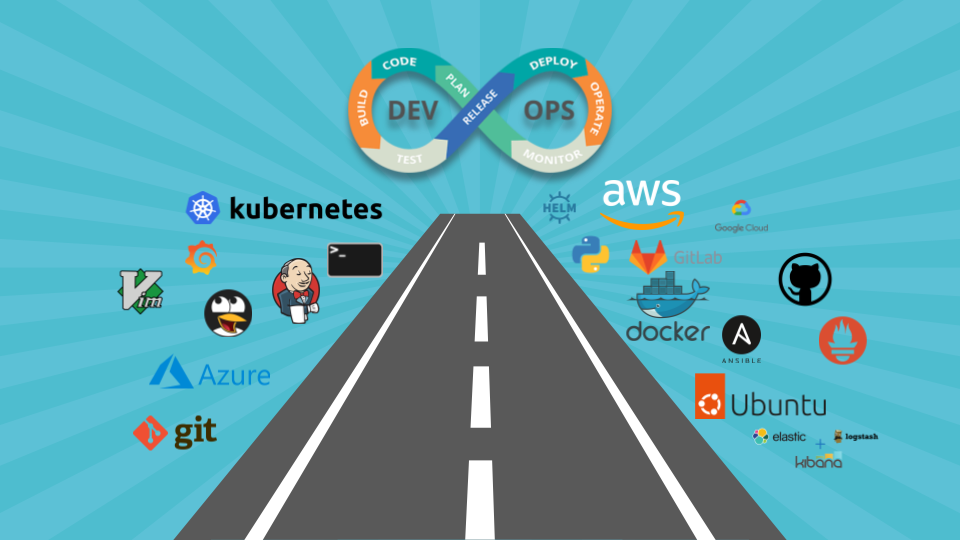Getting Started

A DevOps roadmap is a plan for implementing and integrating DevOps practices and tools within an organization. It typically includes a timeline and milestones for achieving specific goals, such as automating the software development and delivery process, improving collaboration between development and operations teams, and increasing the reliability and scalability of systems.
The roadmap includes identifying and implementing key DevOps tools such as version control systems, continuous integration/continuous deployment (CI/CD) platforms, monitoring and logging solutions, and infrastructure as code (IAC) tools. Additionally, it involves training and education, as well as establishing metrics to measure the success of the DevOps implementation.
Basic Concepts
- Define the goals and objectives of the DevOps implementation, such as increasing the speed and reliability of software delivery, improving collaboration between development and operations teams, and increasing system scalability.
- Identify the current state of the organization's infrastructure, processes, and tools, and assess the gaps that need to be addressed to achieve the goals of the DevOps roadmap.
- Create a timeline and milestones for achieving specific goals, such as automating the software development and delivery process, and establishing metrics to measure the success of the DevOps implementation.
- Identify and implement key DevOps tools such as version control systems, continuous integration/continuous deployment (CI/CD) platforms, monitoring and logging solutions, and infrastructure as code (IAC) tools.
- Provide training and education for team members to ensure they are able to effectively use the new tools and processes.
- Continuously measure and monitor the success of the DevOps implementation using established metrics and adjust the roadmap as needed.
- Foster a culture of collaboration, experimentation, and learning within the organization to support the adoption of DevOps practices and tools.
- Regularly review and update the roadmap to ensure it stays aligned with the organization's goals and objectives.
Please go through this section if you believe a revision is needed on any of its topics. Otherwise, skip to the next section.
Skip to:
- Week 1: Scratching the surface
- Week 2: Refreshing memories
- Week 3: Getting hands dirty
- Week 4: Taking deep dive
- Week 5: Go with the flow
- Week 6: Solidifying foundations
- Week 7-8: Going the extra miles
- Data Engineering
Week 1: Scratching the surface
Goals of the week
- Getting hands on Linux administration and operation
- Virtualization and Familiarize with different Linux distributions
- Keeping up with Linux commands
- Bash scripting
Week 2: Refreshing memories
Goals of the Week
- Understand the basics of networking
- How to troubleshoot and manage networks in a DevOps context
- Basic Python programming will give you a good starting point for
- Using Python for automating DevOps tasks
- Used Ansible to automate different types of tasks
- Configuration management application updation, OS manipulation via Ansible
- Get started with Git
- Understanding of how it can be used in a DevOps context
Week 3: Getting hands dirty
Goals of the week
- Learn Docker and Containerization
- Deep diving Docker
Week 4: Taking deep dive
Goals of the week
- Understand the container orchestration
- Learn Kubernetes bacis concepts and architecture
- Container Orchestration with kubernetes
- Deep diving kubernetes
Week 5: Go with the flow
Goals of the week
- Learn CI/CD processes with GitHub Actions, Gitlab CI or Code Pipelines
- Learn How to use different CD tools for deployments
- Learn How to create Pipelines
Week 6: Solidifying foundations
Goals of the week
- Acquire knowledge and skills in managing and provisioning cloud services from major providers such as AWS, Azure, and GCP.
Week 7-8: Going the extra miles
Goals of the week
- Learn Infra as Code with Terraform.
- Learn Logging and monitoring
- Familiarize yourself with different logging tools Prometheus-Grafana, ELK Stack etc